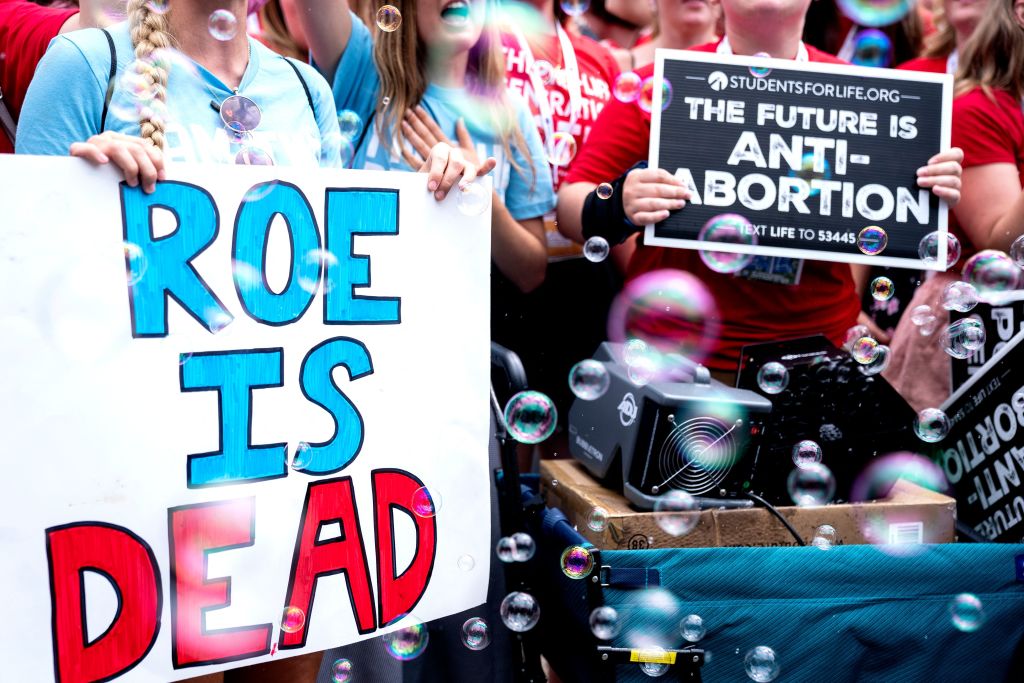Many American women remember where they were one year ago when they heard the news that Roe v. Wade had been overturned by the Supreme Court. In a world of news overload, in which every day is packed with stories branded “breaking news,” this one was different, and it hit at an emotional level.
The Supreme Court’s decision in Dobbs v. Jackson Women’s Health Organization most often sparked feelings of anger, disappointment, and worry among female voters. In survey research I conducted on behalf of All In Together, a nonpartisan group devoted to promoting women’s political engagement, we asked women if they recalled how they felt when they first heard that Roe had been overturned, and we found those feelings of anger to be particularly pronounced with women under age 30 and Democratic women, particularly those with a college degree.
But women are not a monolithic group who think and vote in lock-step. And though Democratic women and their politically independent counterparts shared a similar response to the Dobbs decision, the story for Republican women is much more complicated. They recalled anger and disappointment, yes, but also—in roughly equal measure—feelings of hopefulness and satisfaction.
Republican women generally feel unheard on the issue of abortion, with a majority saying political leaders in their state “don’t really listen to people like me” when deciding abortion policies. At the same time, it is unclear which direction Republican women as a whole would take abortion policy; 1 in 6 say that they think their own state is “too restrictive,” while a third (33 percent) say policies in their state are about right and 3 in 10 say they are “not restrictive enough.”
Republican women’s views on abortion not only span a wide range from guaranteeing full access to full prohibition, but they embrace the strongest views on both sides of the debate more often than the men in their own party. We find that women—particularly Republican women—buck the stereotype that they are more moderate. Their views on abortion are simply more varied and complicated than one might imagine.
Consider Gallup’s data on how Republicans and Republican-leaning independents view abortion; in 2023, Gallup finds that 62 percent of those men say abortion should be “legal in only a few circumstances,” while 15 percent say abortion should flatly be illegal under any circumstances. Meanwhile, twice as many Republican and Republican-leaning women—31 percent—favor a total prohibition on abortion. Yet they are also slighty more likely than their male counterparts to report favoring legal abortion in all or most circumstances.
We find something similar in our All In Together survey, with Republican men more often opting for something like a middle path while Republican women stake out views across the spectrum. When we asked voters whether abortion ought to be handled by the states, protected federally, or restricted federally, only 1 in 5 voters overall call for restrictions to be implemented at the federal level. Even Republican men gravitate most heavily toward the view that states ought to handle the issue. But Republican women are more likely than their male counterparts to select either federal protection or federal prohibition.
Indeed, even as Gallup finds a majority of Americans today now consider themselves “pro-choice,” a 10-point increase from where things stood a decade ago, Republican women have shifted the other direction, with nearly three-quarters today identifying themselves as “pro-life.” At the same time, in our surveys, a substantial minority of Republican women express reservations about banning mifepristone, the drug used in medication abortion.
For Democrats, the politics of abortion are simple. Pro-life Democrats have increasingly become an endangered species. Gallup’s data suggests that while only 59 percent of Democratic women considered themselves pro-choice 20 years ago, that number has skyrocketed to 84 percent today, and Democratic men have followed suit.
There is less unanimity within Republican ranks, especially among women. On the one hand, Republican women are 10 points more likely than Republican men to say abortion is effectively a dealbreaker issue for them. In 2022, Pew found that Republican women were more likely than men in their party to have “thought a lot” about abortion as an issue.
Yet there is also the potential electoral peril stemming from the sizable minority of Republican women who say abortion ought to be legal in some form, to say nothing of the majority of independent and younger women who consider themselves pro-choice and for whom the Dobbs decision galvanized their views.
In the coming days, there will be plenty of reflection on how America has changed as a result of the overturning of Roe. The changing landscape of abortion politics had an effect in the 2022 midterms and will continue to do so in 2024. When we are inevitably asked how Republican women feel about the issue, the most accurate answer I will be able to give is: It’s complicated.






Please note that we at The Dispatch hold ourselves, our work, and our commenters to a higher standard than other places on the internet. We welcome comments that foster genuine debate or discussion—including comments critical of us or our work—but responses that include ad hominem attacks on fellow Dispatch members or are intended to stoke fear and anger may be moderated.
With your membership, you only have the ability to comment on The Morning Dispatch articles. Consider upgrading to join the conversation everywhere.